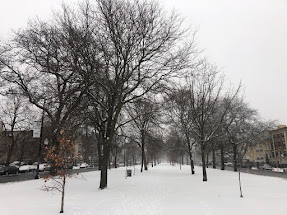The other night, Annie and I were taking our turn starting up the cars to help prevent the batteries from dying in the cold temps we’re having. As we were doing this, a light, fluffy snow was falling from the sky. Walking down our sidewalk, towards the gate which leads out to where our cars are parked, I paused for a moment to take in the peaceful calm that comes over everything when this type of snow happens. The problem I didn’t see coming as I paused was I now live in Chicago where cars and people are constantly around. As a result, this awaited stillness didn’t come. I was disappointed in city life and thankful to been able to experience the stillness that comes with fresh snow when I was growing up in Wisconsin and when I found myself back in Wisconsin, after 3 years in Phoenix, as a candidate last year.

After a recent snowfall (not the big one!) here in Chicago
Walking to the library the next day, thinking about this moment reminded me of the Gospel for the Fifth Sunday in Ordinary Time. In this, we read:
“Rising very early before dawn, he left
and went off to a deserted place, where he prayed.
Simon and those who were with him pursued him
and on finding him said, ‘Everyone is looking for you (Mk 1: 35-37).’” [1]
It seems all Jesus wanted was a moment to step aside and take in God’s beauty and recharge as He prayed-something I was looking for as I paused to take in the calm of the falling snow. As often happens in the Gospel of Mark, the action quickly continues as Jesus is “pursued” as He is trying to get away to pray. Sure, it wasn’t the noise of city life, but I wonder if it cut short the amount of time Jesus had intended to spend in prayer.

A heart to heart moment with my godson on a home visit
during my candidate year.
Isn’t this exactly how prayer often is though? You get settled, ready to take a break from to-do lists and life stressors in order to be with God. Then, a flood of distractions fill the mind as you try to focus on scripture, spiritual ready, journaling, or simple silence in God’s presence. If you’ve never experienced this in prayer, please let me know what your trick is! :D The key during these times, I suppose, is being able to sift through the noise and pay attention to why those things are coming up. Are they truly distractions? Or, are they things God is inviting you to pay attention to and talk to God about during your time together?
This year, this is a skill I’ve been fortunate enough to get to intentionally work on during communal prayer because our morning prayer starts with 20 minutes of contemplative prayer. These moments of silence provide an excellent time to check in and see how I’m doing, what God might be inviting me to focus on in a particular way that day, and simply be with my Beloved (how fortunate are we to have the Blessed Sacrament reserved in our chapel!?).
Some mornings are easier than others, but in the times when the distractions are stronger than normal I try to remember what Elijah has taught me about learning to pay attention to the deeper levels of my interior life in order to properly listen to the ways God is calling me to rest in God’s love, peace, and mercy.
“Then the LORD said: Go out and stand on the mountain before the LORD;* the LORD will pass by. There was a strong and violent wind rending the mountains and crushing rocks before the LORD—but the LORD was not in the wind; after the wind, an earthquake—but the LORD was not in the earthquake; after the earthquake, fire—but the LORD was not in the fire; after the fire, a light silent sound (1 Kgs 19:11-12).” [2]
Or, as Fr. James Martin, SJ words it in an article Lorraine conveniently sent us as I was working on this blog: “For many people God is often manifested in a feeling of calm. As this happens for you, you can start to recognize what God “feels” like in prayer. St. Ignatius started to see that this was the way God worked in him." [3]
In this moment, underneath the noises of life, what “light, silent sound,” what “calm,” is God speaking to you?

Beauty after the first snowfall I experienced at
our motherhouse during my candidate year.
[1]: https://bible.usccb.org/bible/readings/020721.cfm
[2]: https://bible.usccb.org/bible/1kings/19
[3]:https://www.americamagazine.org/faith/2021/01/21/james-martin-book-excerpt-prayer-god-239756?fbclid=IwAR3BQ5w2-sWCi8Ajs12WVP4h8WpEVZf7qLd1D6clu-nZYTv_Q5tR0jsPi7o

